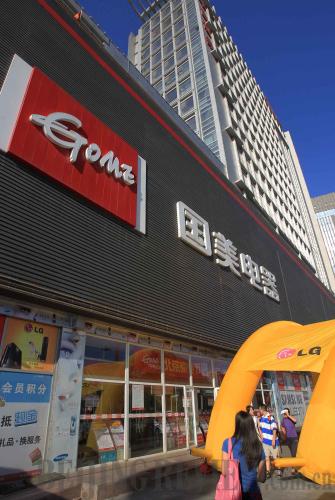|
 |
|
FIGHT MADE PUBLIC: On September 28, the special shareholders' meeting of Gome was held in Hong Kong to tackle the dispute between Gome founder Huang Guangyu and current Gome CEO (LI MINGFANG) |
Even while serving out a sentence behind bars, Chinese billionaire Huang Guangyu fought for control of Gome, the appliance chain he built up in the late 1980s, but lost the high-profile war to sack current chairman, Chen Xiao. The fact that Huang remains Gome's largest shareholder has paved the way for future power struggles over the appliance giant.
Huang's failure to regain control of Hong Kong-listed Gome came at the special shareholders' meeting on September 28, held to vote on key resolutions centered on the grudge between Huang and his bitter foe. Shareholders rejected Huang's proposals to dismiss Chen and another board member close to Chen and appoint his sister, Huang Yanhong, and his corporate lawyer, Zou Xiaochun, as executive directors.
But Huang did succeed in preventing his controlling stake in Gome from being further diluted after a proposal by the Chen-led board to issue additional stock of up to 20 percent of Gome was rejected.
Another resolution to keep three directors from the Boston-based U.S. private equity firm Bain Capital, including Bain Capital's Managing Director Jonathan Jia Zhu, was also adopted.
The spat reflects corporate governance problems, seen in a large number of China's private companies seeking to trade their stocks on the capital market, which eventually spill into the public arena.
A grudge takes root
Before being sentenced to 14 years for bribery and insider trading last May, Huang, China's youngest self-made billionaire, was regarded as an idol for many pioneering businesspeople.
The high school dropout founded Gome in Beijing on January 1, 1987 with a shop of less than 100 square meters selling an array of home appliances.
Just over two decades later, Gome has outlets in about 160 mainland cities, Hong Kong and Macao, and is the largest outlet for Chinese appliances.
Like many Chinese business chiefs, Huang filled every important position with "trustworthy" relatives or candidates from his hometown in Guangdong Province.
The retailer was listed on the Hong Kong stock market in June 2004, and had 1,141 outlets by the first half of 2010, with its first-half sales revenue standing at $24.9 billion yuan ($3.7 billion).
And just as Gome has grown, so too have its rivals, including Jiangsu-based Suning Appliance, Beijing-based Dazhong Electronics, Shanghai-based Yongle (China Paradise)—of which Chen Xiao was the controller—and some foreign-funded appliance retailers, such as Best Buy.
To fuel his expansion ambition, Chen signed an agreement of Valuation Adjustment Mechanism with Morgan Stanley right after the investment bank and CDH Investments, a Chinese private equity fund, acquired a 20-percent stake in Yongle at $50 million in January 2005. Chen and his management team pledged to realize $675 million yuan ($101 million) in profit by 2007. If the profit was higher than the promised amount, Morgan Stanley agreed to sell certain shares to Chen—otherwise, Chen would have to sell his shares to the investment bank.
To increase performance and win against Morgan Stanley, Chen decided to forge a short-lived alliance between Yongle and Dazhong Electronics, which brought Yongle to the brink of insolvency. In a desperate search for a buyer, Chen turned to Gome. A deal was arranged. After merging Yongle with Gome in July 2006, Huang invited Chen to serve as Gome's CEO.
After Huang's arrest in 2008, banks refused to grant Gome additional loans, forcing Chen to introduce Bain Capital as a strategic investor to ease Gome's cash needs. Bain Capital agreed in June that year to spend HK$1.8 billion ($232 million) buying seven-year convertible bonds from Gome at an annual interest rate of 5 percent.
But the deal hinged on a special condition: three of Gome's board members must be from Bain Capital and removal of two of Gome's three executive directors—Chen, Wang Junzhou and Wei Qiuli—would be seen as a breach of contract. Such a breach would entitle Bain Capital to demand Gome buy back the convertible bonds at a price 50 percent higher than Bain Capital's purchasing price.
Huang, believing the deal threatened his control of Gome, began grumbling. He vetoed the reelection of the three Bain Capital directors in May 2010, but they were immediately reappointed in a board meeting engineered by Chen.
Chen then proposed a five-year plan for Gome in July that would open 700 stores and 11 national and regional logistics bases, renovate 400 existing stores and build 11 super-large flagship stores.
Fundraising
The ambitious plan required approximately 10 billion yuan ($1.5 billion), far exceeding the 6 billion yuan ($895.5 million) in available funds on Gome's balance sheet. To finance the plan, Chen proposed another fundraiser with a target of around 7 billion yuan ($1.04 billion)—the retailer needs 3.5 billion yuan ($522.4 million) for daily operations—by issuing additional stock.
| 